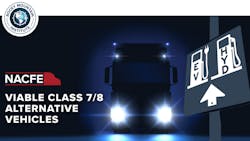NACFE examines BEVs, alternative fuels in newest guidance report
The North American Council for Freight Efficiency (NACFE) recently released its fourth guidance report on electric trucks.
Trucking is on the cusp of significant changes in powertrains, with an evolving array of available choices, from improved diesel, to hybrid, to electric. In its latest guidance report, Viable Class 7/8 Electric, Hybrid and Alternative Fuel Tractors, NACFE found that not only is the list of alternative fuels and related powertrains growing, but these technologies are beginning to reach the point of production-quality vehicles.
“Fleets should not delay engaging with these new technologies,” said Mike Roeth, NACFE’s executive director. “By exploring the use of these technologies and adopting where possible, they will help optimize these technologies for their own duty cycles and applications and take advantage of all the benefits of the various choices.”
The report looked at these promising near-term options:
“Our rolling laboratory fleet approach allows UPS to evaluate real-world use cases among alternative powertrains,” said Bill Brentar, director of maintenance and engineering for transportation equipment at UPS. “Accelerating adoption of alternative technologies across the industry will expand availability, add scale to reduce costs, and speed selection of the best alternatives for different route conditions.”
In the long run, electric powertrains will dominate the marketplace, NACFE says, but as the transition occurs, some technologies will bridge the present and the future, a period described by the council as the “messy middle.”
The study team offered these six major findings:
The report includes two parity charts comparing these emerging technologies with current diesel or gasoline vehicles. One looks at the current situation with alternative-fueled vehicles, and the other looks at parity in 2030.
This guidance report is the fourth in a NACFE series on CBEVs. Reports are available individually or as a package at nacfe.org/future-technology.
“These reports are a great resource for Schneider as we identify and test the next opportunities for commercial battery-electric trucks,” said Rob Reich, Schneider’s executive vice president and chief administrative officer. “The research, along with insights from manufacturers, provides the opportunity for us, as well as others across the industry, to prioritize our testing resources to find compelling solutions that can be implemented.”
- Commercial battery electric
- Fuel cell hybrid electric
- Compressed natural gas
- Renewable natural gas
- Liquefied natural gas
- Propane
- Hybrid diesel-electric
- Renewable diesel
North American freight movement is becoming more predictable, with dedicated routes enabled by e-commerce and other technologies, offering better duty cycles for alternative powertrains.
Each alternative fuel powertrain offers benefits in the short term compared to current diesel and may have enough duty-cycle scale to offer total cost of ownership and emissions savings.
Commercial battery electric vehicles (CBEVs) and fuel cell trucks will be capable of lower total cost of ownership in the 2030 time frame.
Vehicle specifications will be better optimized for the duty cycle and technology of the first user, limiting the applicability of the equipment for second or third users.
There will be a “messy middle” until CBEVs and fuel cell electric vehicles (FCEVs) alone power these trucks.
A future zero-emission freight world will have only electric-based vehicles (CBEV, FCEV or catenary electric), powered well-to-wheel from truly renewable sources, such as hydro, solar, and wind.
About the Author
Fleet Owner Staff
Our Editorial Team
Kevin Jones, Editorial Director, Commercial Vehicle Group
Cristina Commendatore, Executive Editor
Scott Achelpohl, Managing Editor
Josh Fisher, Senior Editor
Catharine Conway, Digital Editor
Eric Van Egeren, Art Director
